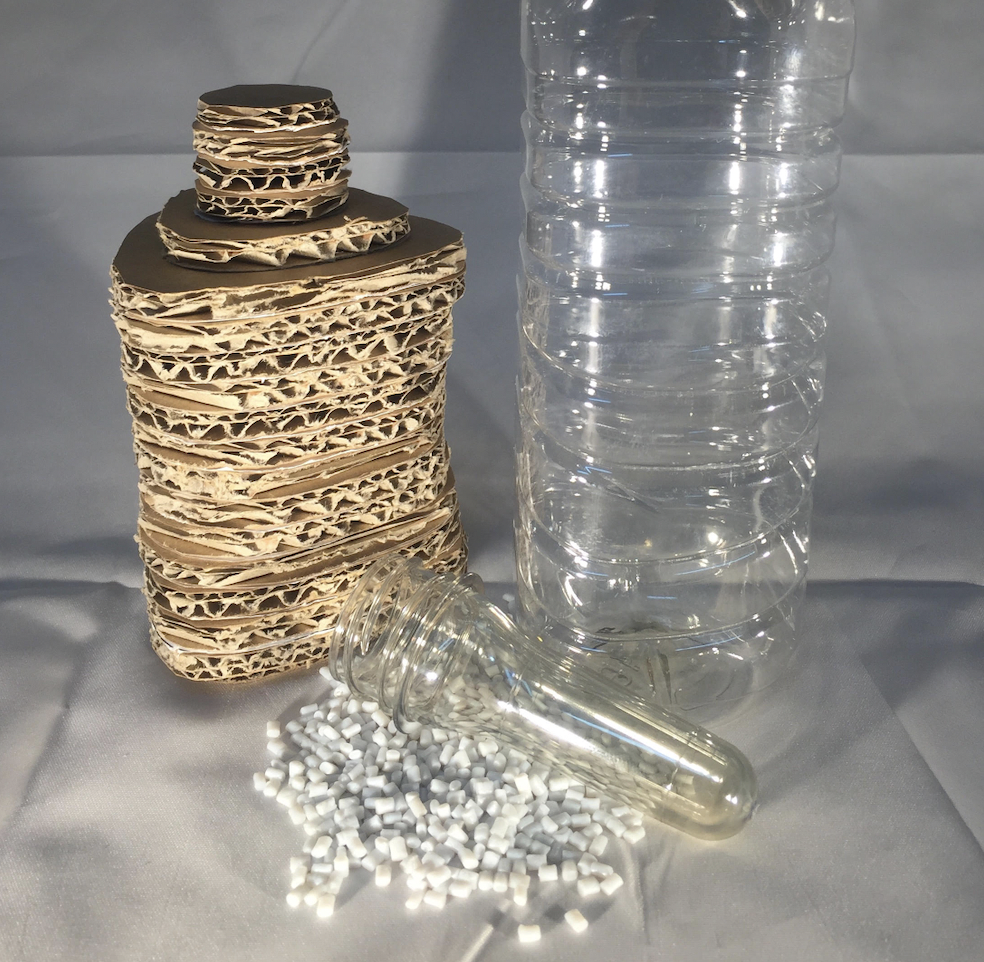Green energy won’t be enough to solve climate change. The energy sector contributes around 55% of greenhouse gas emissions. Materials used in products make up the other 45%. If the world is going to get to net-zero what is needed is a sustainable materials revolution, argues Origin Materials, a U.S. scale-up that is partnering with traditional companies to make a wide range of end products carbon negative including plastics, packaging, clothing, textiles, car parts, tires, carpeting and toys.
It’s a $1 trillion addressable market. Origin, which turns inexpensive, sustainable wood residues into carbon-negative materials, says it can make a bio-based polyethylene terephthalate (PET) end-product that is chemically identical to PET made from fossil fuels. Co-founder and co-CEO John Bissell, a chemical engineer, calls it a “once-a-planet” transition away from fossil-based to sustainable feedstocks.
“We offer companies drop in materials that are carbon negative, at prices that are expected to be competitive with fossil-based materials,” says Bissell. The fact that its bio-based materials are drop-in and price competitive is “a really big deal” because it is costly for companies to change machinery used to produce packaging and products and many new green materials are double or more the cost of fossil fuel-based materials, he says. “This explains the huge increase in demand that we are seeing.”
Founded in 2008 Origin went public via a special acquisition purpose company (SPAC) this past June, listing on Nasdaq. The terms of the deal included investments from customers Danone, Nestlé and PepsiCo. Since announcing the transaction in February, Origin has increased customer demand from $1 billion to $4.2 billion by adding new clients such as Solvay, Mitsubishi Gas Chemical, Ford Motor Company, Kolon Industries and PrimaLoft, a brand of patented synthetic microfiber thermal insulation material that supplies some 900 major brands, including L.L. Bean, Lululemon and adidas.
The deals are yet another example of how collaborations between young companies and large corporates can help solve the U.N.’s Sustainable Development Goals.
“What we feel in conversations with companies is that this now a high priority,” says Bissell. “They are eagerly looking for solutions. Decarbonizing PET is really hard. Rather than trying to tackle this challenge alone it is easier to innovate together.”
PrimaLoft CEO and President Mike Joyce agrees. “No one company or industry alone can bring about necessary change,” he said in a written response to questions from The Innovator. “We will need to continue to come together across industries to push forward. Within the textile industry, every facet from manufacturing through retail and consumers will need to play a part. Collaboration will absolutely have a key role. Innovative new technologies that focus on reducing our impact will ultimately proliferate throughout the industry and beyond.”
Getting To Zero-Carbon Materials
The Origin platform converts C-6 cellulose, an organic compound consisting of oxygen, carbon and hydrogen that’s extracted from sustainably harvested wood, cardboard or agricultural waste, into two primary building-block chemicals, chloromethyl furfural (CMF) and hydrothermal carbon (HTC). Those chemicals are then converted into plant-based zero-carbon high-functioning materials including 100% recyclable PET, activated carbon for water filters, carbon black, toners and other materials with broad applications.
The picture displayed with the article is a sample bottle Origin produced using technology at its pilot plant in West Sacramento, California, which has been developing the technology platform for over a decade. The process can use a wide variety of wood residue including sawdust and even old corrugated cardboard. Beside the bottle are PET pellets and an unblown bottle that has not yet been shaped into the final product. The bottle is chemically and physically identical to petroleum based PET, but made with Origin technology. The company says that makes it a very attractive drop in solution for any PET consumer looking to transition to sustainable materials,
It is no surprise then that Origin is making major in-roads into multiple industries by collaborating with some of the biggest users of PET.
All development and production to date has been in laboratories and pilot plants. The focus now is on commercial production. Origin 1, the company’s full-scale production plant, is already under construction in Sarnia, Ontario, Canada, and plans are already being made for additional facilities.
Innovating Across Industries
Billions of dollars of PET are sold each year. It is used to make auto parts, clothing, textiles, beverage bottles and more. Each industry has its own unique set of challenges in moving to bio-based materials.
Three of Origin’s new partnerships are targeting the automotive industry as it undertakes a massive global effort to decarbonize its supply chains in search of the zero-carbon car.
In November Origin announced a strategic partnership with Kolon Industries, a Korea-based provider of chemicals and materials, to industrialize novel polymers and drop-in solutions for select applications, with an initial focus on automotive applications.
In October, Origin announced a partnership with Drive+, a platform of automotive suppliers which is in close collaboration with Drive Sustainability, a group of eleven of the world’s largest automotive manufacturers. The new partnership with Drive+, which is facilitated by CSR Europe (The European Business Network for Corporate Sustainability and Responsibility), will allow Origin to collaborate with Drive Sustainability Partners on raw materials standards, carbon neutrality and other key sustainability topics in the automotive supply chain. The network of eleven auto manufacturers consists of BMW Group, Daimler AG, Ford, Honda, Jaguar Land Rover, Scania CV AB, Stellantis, Toyota Motor Europe, Volkswagen Group, Volvo Cars and Volvo Group.
In April Origin announced a collaboration with Solvay, a Belgium-based international chemical company, to provide the automotive industry with drop-in ready materials solutions to enable the industry’s low-carbon transition. The agreement involves a specialty polyamide, a polymer for internal combustion engine technology as well as e-mobility systems like e-motors and power electronics that can provide resistance to heat, toughness, corrosion, and operate at high voltages.
Origin says its patented technology platform will help to revolutionize the production of a wide range of end products. For example, the partnership with Kolon goes beyond auto applications. It includes co-development aimed at commercializing polyethylene furanoate (“PEF”), a polymer with a combination of performance characteristics for packaging and other applications, including enhanced barrier properties when compared with PET, degradability, and other qualities. Origin’s technology platform is also expected to produce cost-competitive, sustainable, carbon-negative furandicarboxylic acid (FDCA), the primary precursor to PEF.
Origin has also entered a partnership with Alliance to End Plastic Waste, which includes thirty companies across the plastics value chain who are looking to develop and bring to scale solutions that will minimize and manage plastic waste and promote solutions for used plastics by helping to enable a circular economy.
The U.S. bio-based materials scale-up is additionally a member of the NaturALL alliance, a research consortium it formed in 2017 with Danone and Nestlé Waters to accelerate the development of innovative packaging solutions made with 100% sustainable and renewable resources. PepsiCo later joined the Alliance to advance the shared goal of creating beverage containers from biomass feedstocks that do not divert resources or land from food production for human or animal consumption. Replacing PET in beverage bottles with a bio-based material requires replacing two different molecules. Origin has developed what it says is the most significant of them. Danone, Nestlé Waters and PepsiCo “need to work on the second molecule to bring it together,” says Ron Khan, R&D Vice President of Beverages Packaging at PepsiCo, the multinational food, snack, and beverage corporation. “None of us can do this ourselves.” (Click here to read The Innovator’s interview of Khan and the need for cross-industry collaborations to reach sustainability goals).
The technology being explored represent a scientific breakthrough for the sector, and the Alliance says it aims to make it available to the entire food and beverage industry.
The textile industry is also looking for bio-based solutions for its products. The majority of PrimaLoft’s products, which are used in everything from outerwear to footwear, sleeping bags and gloves, are comprised of polyester, which is currently derived from fossil fuels. “We’ve have gone to great lengths to reduce the impact of our materials through the extensive use of recycled materials, as well as innovations that drastically reduce the carbon emissions in our manufacturing processes, provide end of life solutions, and are capable of being chemically recycled in a circular economy,” says Joyce, the company’s CEO and President. “But the ultimate goal is to remove the need for fossil fuels entirely. Our partnership with Origin Materials is a significant step in that direction.”
While Origin PET is chemically identical to fossil-based PET and is compatible with existing manufacturing processes, “functionalizing” the material for textile applications can have its own special requirements, says Joyce. “Our strategic alliance involves both companies working together to provide a seamless transition from fossil-based PET to non-fossil based,” he says. “Origin’s expertise is the development of cost-advantaged, carbon-negative materials that reduce the need for fossil fuels. At PrimaLoft, our expertise is in fiber technology so, we’ll be focused on fully functionalizing Origin’s technology for applicable use in textiles, focusing on the capability to form a final product through successful extruding, processing and dyeing, as well as securing industry certifications.”
Origin’s ability to make bio-based carbon black could also be game-changing for the tire industry. Traditional methods of making the carbon black used in tires produce emissions and carcinogens. If Origin can make a bio-based replacement material with similar properties that is free of carcinogens and carbon negative, then companies could switch from thinking “how little can I add to how much can I add?” says Bissell.
A Changing World
One obstacle to scaling up the use of technologies on Origin’s platform is the complexity of supply chains, says co-CEO Rich Riley. Different companies have different relationships with their suppliers. Some have the clout to demand that their suppliers use carbon-free technologies. Others don’t. Riley is optimistic. Companies used to think reducing their power consumption was enough. Making their products greener was a low priority. Now they are facing pressure from their shareholders, customers, and regulators to do more. “The world has changed a lot in a relatively short period of time,” says Riley. “That is why companies are partnering with us. The tailwind is incredible.”
This article is content that would normally only be available to subscribers. Sign up for a four-week free trial to see what you have been missing.







